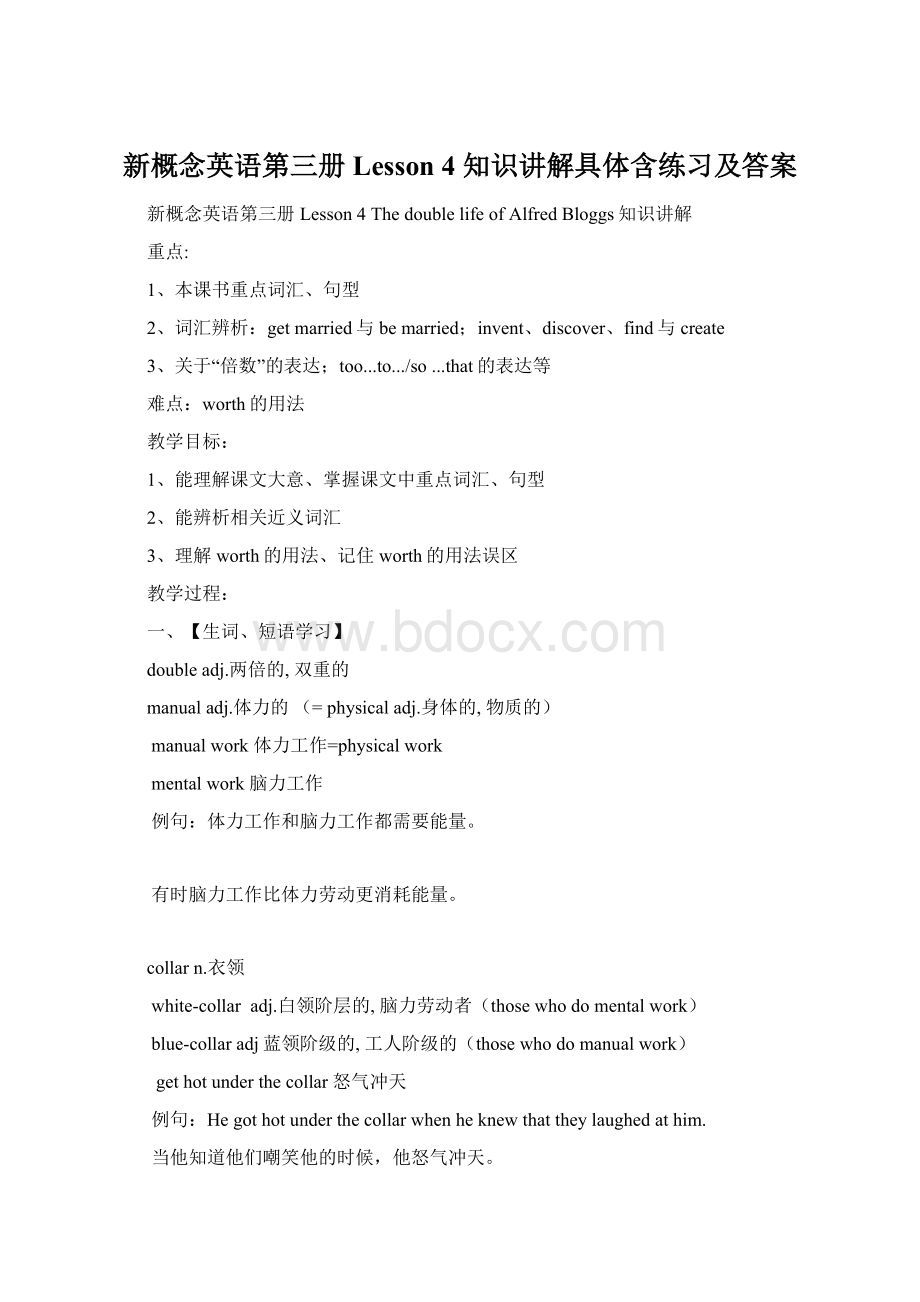新概念英语第三册Lesson 4 知识讲解具体含练习及答案.docx
《新概念英语第三册Lesson 4 知识讲解具体含练习及答案.docx》由会员分享,可在线阅读,更多相关《新概念英语第三册Lesson 4 知识讲解具体含练习及答案.docx(16页珍藏版)》请在冰豆网上搜索。

新概念英语第三册Lesson4知识讲解具体含练习及答案
新概念英语第三册Lesson4ThedoublelifeofAlfredBloggs知识讲解
重点:
1、本课书重点词汇、句型
2、词汇辨析:
getmarried与bemarried;invent、discover、find与create
3、关于“倍数”的表达;too...to.../so...that的表达等
难点:
worth的用法
教学目标:
1、能理解课文大意、掌握课文中重点词汇、句型
2、能辨析相关近义词汇
3、理解worth的用法、记住worth的用法误区
教学过程:
一、【生词、短语学习】
doubleadj.两倍的,双重的
manualadj.体力的(=physicaladj.身体的,物质的)
manual work体力工作=physicalwork
mental work脑力工作
例句:
体力工作和脑力工作都需要能量。
有时脑力工作比体力劳动更消耗能量。
collarn.衣领
white-collaradj.白领阶层的,脑力劳动者(thosewhodo mental work)
blue-collaradj蓝领阶级的,工人阶级的(thosewhodo manual work)
gethot underthe collar怒气冲天
例句:
Hegothotunderthecollarwhenheknewthattheylaughedathim.
当他知道他们嘲笑他的时候,他怒气冲天。
sacrificevt.牺牲,献出(to give up for good purpose)
--sacrifice one's life for the country为国家献身
--sacrifice time牺牲时间、贡献时间
sacrificen.牺牲(--make many sacrifices)
即学即用:
伟大的人往往不在意为别人贡献一切。
过去的牺牲使他赢得了别人的尊重。
privilegen.好处(=advantagen.优势,有利条件,利益)
--sacrifice one's advantage/privilege牺牲掉某人的好处
privilegen.特权,特别待遇(=special right)
--give sbthe privilege of doing sth特许某人做某事
privilegeda.荣幸的=honored
--Weareprivilegedtonighttohaveourheadmasterasourspeaker.
即学即用:
能出席你的婚礼我感到很荣幸。
公司要发展的好,就不能给任何人特权。
你愿意义务地帮助穷人吗?
dustmann.清洁工
corporationn.公司=companyindustry企业、工业
overallsn.工作服
showern.淋浴
secretn.秘密adj.秘密的,隐秘的
confidentialadj.机密的
keepsth secret保密
--It's between you and me.此事只介于你我之间。
--I'll keep it to myself.我会保守秘密的。
in secret私下里(=secretly,in private,privately)
--I was told about it in secret.
in the secret知道内情
--He was in the secret from the beginning
即学即用:
他那么有信心,一定知道内情。
在座的每个人务必保守这件事。
虽然他们是师生,但私底下却是好朋友。
statusn.地位(=social position)
statuen.雕像,塑像(Lesson3)
risen.发生,出现
lossn.损失
fellown.伙伴,朋友,同事adj.同伴的,同事的,同道的
二、【课文讲解】
1.These days, people who do manual work often receive far more money than people who
work in offices.
people who do manual work=blue-collar workers
peoplewhodo mental work=white-collar workers=people who work in offices
for more money(far副词用来加强语气=much)
例句:
高尚的(gracious)穷人比势利的夫人更值得让人尊重。
2.People who work in offices are frequently referred to as "white-collar workers' for the
simple reason that they usually wear a collar and tie to go to work.
refer to...as = regard...as把...看作为
--I always refer to him as bookworm(n.书呆子)
for the simple reason=for 引导的原因状语从句“出于这个原因”
for the reason that(后加从句)多用于正式文体,because多用于口语中。
--Heisreferredtoasabookwormforthesimplereasonthathesparenoeffortsreading.
--Hewassenttoprisonforhecouldnotpayhisdebts.
即学即用:
努力奋斗的人更容易被视为成功者。
(用定语从句表达)
因为他脾气暴躁,所以他老婆跟他离婚了。
(getdivorcedwithsb)
出于这个原因,他决定一览长城。
3.Such is human nature, that a great many people are often willing to sacrifice higher pay for
the privilege of becoming white-collar workers.
human nature人性
such...that...(that引导同位语从句,进一步补充说明such的基本内涵)
--His kindness was such that we will never forget him.
=Such was his kindnessthatwe will never forget him.(such在句首要倒装)
=Hewassokindthat we will never forget him.
--Such is human nature that we want to get a lot of things free.(进一步说明是什么样的humannature)
介词for表示一种目的
be willing to do sth=be ready to do sth心甘情愿做
beunwillingtodosth不愿意做某事
例句:
不愿意为别人牺牲时间的人往往很难取得成功。
这就是他的精神,不管做什么事情都永不言弃。
4.This can give rise to curious situations, as it did in the case of Alfred Bloggs who worked as
a dustman for the Ellesmere Corporation.
give rise to=(leadtov.导致,通向)
表示“导致、引起”的词汇还有:
resultin、cause
--Such conduct might give rise to misunderstandings.这种行为会引起误解。
--The bad conditions have given rise to a lot of crimes.不良的环境引起了犯罪。
in the case of就...来说,关于,就...而言(=concerningprep.关于,涉及,就...说)
--Stealing isno shame in the case of him.偷窃对他来说不是一件可耻的事。
in case of(副词)万一,以防(incaseconj.万一)
incaseof+名词
以防万一
incasethat+句子
--You should ensure your house in case of fire.(ensurevt.保证;担保,保险)
--Takeumbrellaincaseofrain带上雨伞以防下雨。
who引导定语从句
即学即用:
带上雨伞以防下雨。
(用that引导从句)
我们不得不小心谨慎以防意外事情的发生。
条条大道通罗马。
他永不屈服的精神使他战胜了病痛。
5.When he got married, Alf was too embarrassed to say anything to his wife about his job.
too embarrassed to say太尴尬而没有说明
be ashamed of感到羞愧,惭愧
--Alfwasashamedofhisjobasadustman.
Sbis/aretoo+adj+todosth=sbis/sreso+adj+that+从句太……了以至于不能……
Itistoo+adj+forsbtodosth对某人来说太……了以至于不能……
--Heistootiredtowalkanylonger.他太累了,再也走不动了。
=Heissotiredthathecouldn’twalkanylonger.
--Itwastoodifficultforhimtofinishthetaskwithin2days,butheisabletodothateasilynow.在过去,对他来说在两天内完成任务太难了,但现在他能轻松地做到。
marry强调动作
--He married the girl.他娶了这个女孩。
get married强调过程
--Lastyeartheygotmarried.
be married (to sb)强调状态
--The old man has been married to his wife for 50 years.
即学即用:
他已经结婚五年了。
你打算什么时候结婚呢?
这部电影太感人了,以至于所有人都流泪了。
对我们来说,在1小时内写1篇作文不是难事。
6.He simply told her that he worked for the Corporation.
simply副词--用来修饰限定动词told,“仅仅”
--JeanValjeanwasputintoprisonjustforthereasonthathehadstolenapieceofbread.
冉阿让被判入狱,仅仅是因为他偷了一块面包。
7.Every morning, he left home dressed in a smart black suit.
dressed in a smart black suit穿上一身漂亮的黑色西装
dressed分词作状语=wearing
--He go to work dressed in a beautiful coat.
--He left home wearing a smart black suit.
即学即用:
那天他穿着一套极其奇怪的衣服去火车站。
那天他穿着一套极其奇怪的衣服。
8.He then changed into overalls and spent the next eight hours as a dustman.
changed into换上、变为
changebackinto换回
刹那间,天气由晴转阴。
春天到了,树木又重新绿了起来。
9.Before returning home at night. He took a shower and changed back into his suit.
Before returning home=Before he returned home
before和动名词搭配,相当于before引导的时间状语从句。
如果运用动名词形式,动名词的逻辑主语必须是主句的主语
--After getting home,he had a good rest.
--Before having dinner,he finished all his homework.
takeashower淋浴、洗澡=takeabath
即学即用:
Beforegettingdark,hegottothetrainstation.(改正病句)
在见到你之前,我已经听说你那天会去图书馆。
10.Alfdid this for over two years and his fellow dustmen kept his secret.
Alf's wife has never discovered that she married a dustman and she never will, for Alf
has just found another job.He will soon be working in an office.
she never will=she will never discover the secret
在省略句式中,never要放在助动词之前
--“will you go to see her?
”
--“I will never to to see her"="No,I never will."
discover发现
辨析:
invent--discover-find-create
invent
发明(过去不存在的事物)、编造、捏造
discover
发现(本来就存在却不为人所知的)
find
发现、得到、找到
create
经过努力/劳动使事物从无到有。
create主要意思是“创造”,即产生新的东西,其对象往往是精神上的。
如艺术、文学作品中的人物以及新的科学领域等,也可指创造出新的具体事物。
invent主要意思是“发明”,是指产生前所未有的东西,其对象往往是物质性的。
inventionn.发明inventorn.发明家
discover主要意思是“发现”,其对象是一直存在但以往未被人们发现或了解的东西。
如元素、地域或客观规律等。
discoveryn.发现discoverern.发现者
find主要意思是“发现,找到丢失的人或物”,或指“感到”。
即学即用:
①TheideathatGod______theworldiswrong.
②ThomasEdison______thefirstsmallelectriclamp.
③Theynever______howtoopenthisbox.
④Iwasverysurprisedto______youwereinthebus.
11.He will be earning only half as much as he used to, but he feels that his rise in status is well
worth the loss of money.
half as much as
half/a quarter/twice/three times+as...as...表示倍数
--I won't marry a man who is twice as old as me.
--We got three times as many people as we expected.
--This room is about three times as large as that one.
是...的几倍:
...as+形容词或副词原形+as...
比...多几倍:
...times+形容词或副词比较级+than…
--This road is four times longer than that one.这条路是那条路的5倍长。
=This road is five times as long as that one.
What he obtained is well worth the loss of time.他的所得是值得花时间的。
well 副词用来加强语气,修饰形容词worth
即学即用:
这本书是那本书的3倍厚。
(用两种方法表达)
他现在住在东莞,东莞是广州的三分之一大。
跟“倍数”有关的表达法还有:
(1)"A+be+倍数+the+计量名词+of+B"
例句:
Afriendofminewasmakingtwicethesalaryofcollegeinstructorsduringherfirstyearinthatcompany.我的一个朋友在那个公司工作的第一年挣的钱就已经是大学教师薪水的两倍了。
(2)"The+计量名词+of+A+be+倍数+that+of+B"
例句:
Intightturnsandrecoveringfromdives,theforceitcanpullisninetimesthatofgravity.
在急转弯和俯冲后拉升时,他的拉力能达到重力的9倍。
(3)表示增长的倍数比较关系可以用“动词+by+数词/百分比/倍数”来表达。
例句:
Ghana’spopulationhasbeengrowingby3.2percentayear.
加纳的人口一直在以每年3.2%的速度增长。
12.From now on, he will wear a suit all day and others will call him 'Mr. Bloggs', not 'Alf'.
fromnowon从现在开始
fromthenon从那时开始
三、【难点把握】
worth(值得)的用法
◆用法一:
犯不上跟她生气。
误:
She’snotworthtogetangrywith.
正:
She’snotworthgettingangrywith.
析:
(be)worth后接动词时,该动词不能用不定式,而用动名词。
注:
这类结构在现代英语中也可改用形式主语it,如上面的误句也可改为:
Itisn’tworthgettingangrywithher.
再如:
Thefilmisworthseeing./Itisworthseeingthefilm.(这部电影值得看)。
◆用法二:
这本书很不错,值得再读一遍。
误:
Thebookisexcellent.It’sworthreadingasecondtime.
正:
Thebookisexcellent.It’sworthbeingreadasecondtime.
析:
(be)worth后接动名词时,即使该动名词具有被动意味,也总是用主动形式。
◆用法三:
这个博物馆值得你去看看。
误:
Youareworthvisitingthemuseum.
正:
Itisworthyourwhilevisiting[tovisit]themuseum.
析:
如以上两例所析,worth后接动词时要用动名词,但是注意这类结构有以下特点:
①句子主语通常就是其后动名词的逻辑宾语;
②若句子主语不是其后动名词的逻辑宾语,那么其主语就应是形式主语it。
另外注意:
与worth后接动词必须用动名词不一样,worth(one’s)while后接动词时可用动名词也可用不定式(且这类句型的主语通常是形式主语it)。
◆用法四:
这个计划很值得一试。
误:
Theschemeisveryworthatry.
正:
Theschemeiswellworthatry.
析:
要加强worth的语气,习惯上不用very,而通常用well。
◆用法五:
这台脑不值你付的那些钱。
误:
Thecomputerisnotvalue[valuable]whatyoupaid.
正:
Thecomputerisnotworthwhatyoupaid.
析:
value=价值(是名词),valuable=有价值的(是形容词),两者均不能后接what从句。
而worth(值得……的)后面可以加名词短语、带逻辑主语的动名词以及what从句。
即学即用:
长城值得游览。
(用两种方法)
他不值你为他说的那些话。
西湖值得你去看看。
(用两种方法)
四、【课后作业】
一、“倍数”练习
将下列句子译成英语。
基础练习
1.他的手有孩子手的四倍大小。
2.他们的屋子大约是我们的三倍大小。
3.资费一般是固定电话的2到4倍。
提高练习
1.这个热电站比那个热电站大三倍。
2.铁的重量几乎是铝的三倍。
3.新扩建的广场为以前的四倍大。
4.通过玻璃传输的激光发射光可以传送高达标准电话线25万倍的数据。
单词提示:
玻璃gla